Research on Accounting Practices: Agency, Compensation, and Auditing
VerifiedAdded on 2020/06/05
|11
|3256
|82
Report
AI Summary
This comprehensive research report delves into various aspects of accounting practices, including internal financial reporting, agency theory, and auditing. The report explores different approaches to financial reporting, examining the advantages and disadvantages of each, such as sampling versus using the total population. It discusses the application of agency theory in the context of compensation plans, analyzing the relationships between stakeholders and the impact of compensation on employee risk-taking. The research also investigates auditing practices, focusing on auditors' responsibilities, the expectation gap, and factors influencing audit performance. The report incorporates literature reviews, methodologies, and case studies to provide a thorough understanding of the subject matter, making it a valuable resource for students and professionals alike.
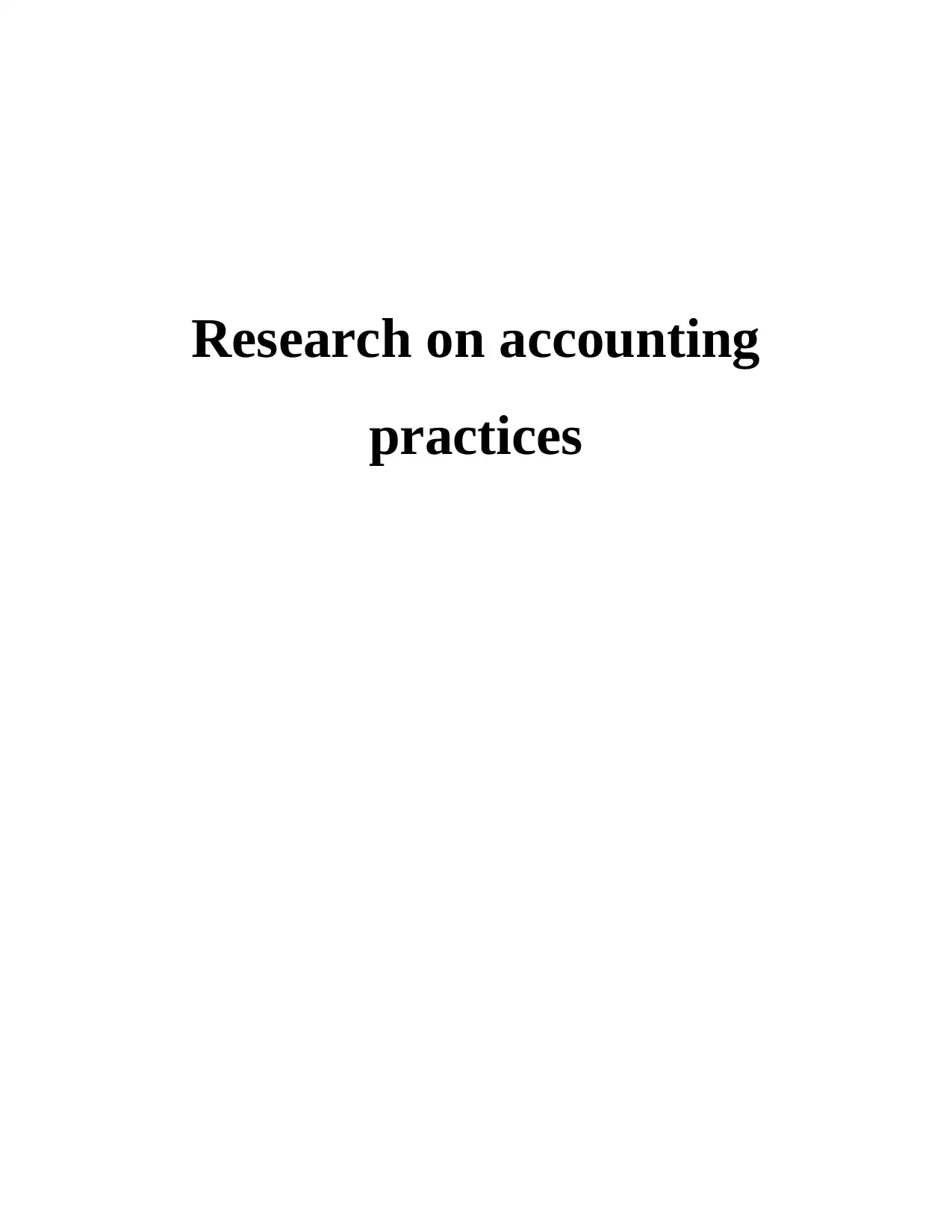
Research on accounting
practices
practices
Paraphrase This Document
Need a fresh take? Get an instant paraphrase of this document with our AI Paraphraser
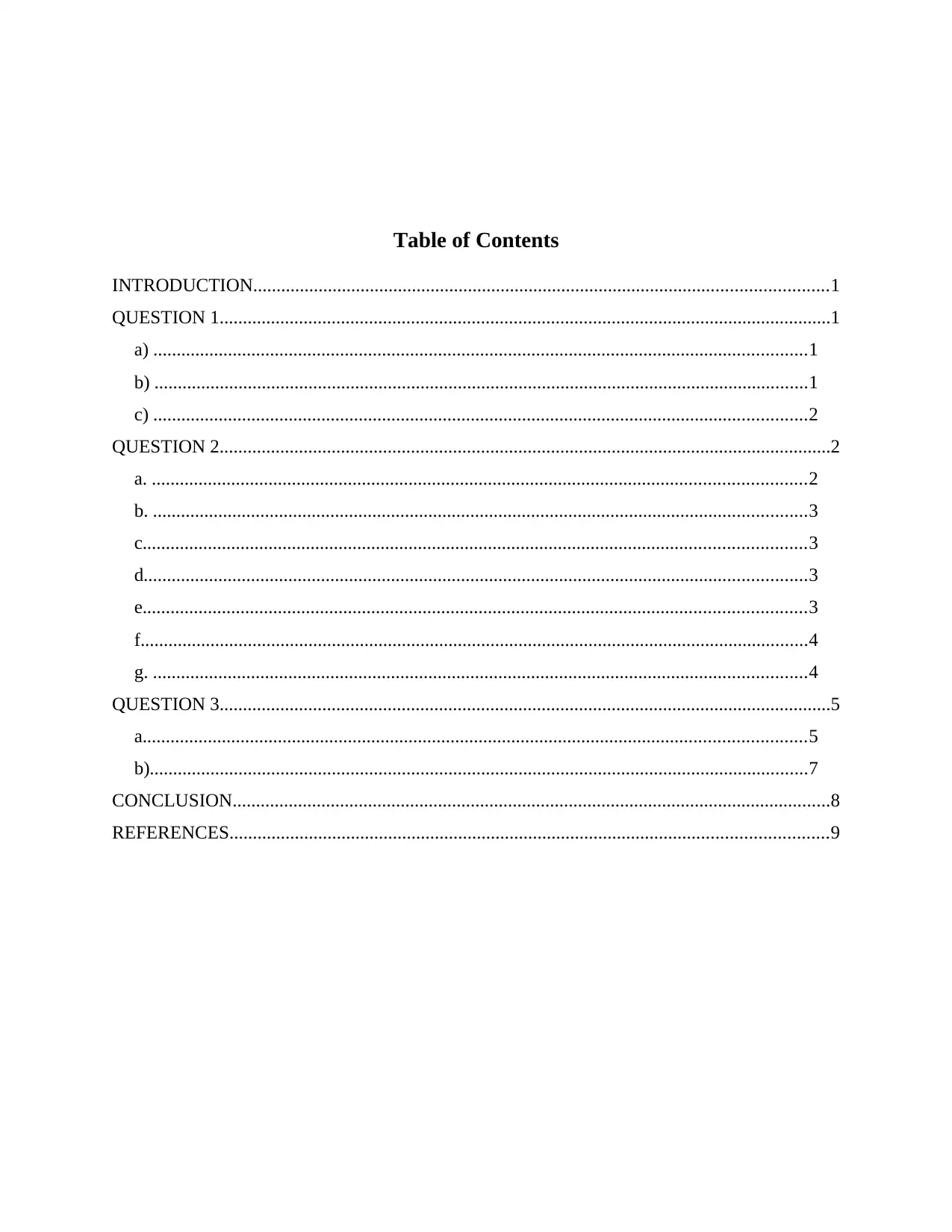
Table of Contents
INTRODUCTION...........................................................................................................................1
QUESTION 1...................................................................................................................................1
a) ............................................................................................................................................1
b) ............................................................................................................................................1
c) ............................................................................................................................................2
QUESTION 2...................................................................................................................................2
a. ............................................................................................................................................2
b. ............................................................................................................................................3
c..............................................................................................................................................3
d..............................................................................................................................................3
e..............................................................................................................................................3
f...............................................................................................................................................4
g. ............................................................................................................................................4
QUESTION 3...................................................................................................................................5
a..............................................................................................................................................5
b).............................................................................................................................................7
CONCLUSION................................................................................................................................8
REFERENCES................................................................................................................................9
INTRODUCTION...........................................................................................................................1
QUESTION 1...................................................................................................................................1
a) ............................................................................................................................................1
b) ............................................................................................................................................1
c) ............................................................................................................................................2
QUESTION 2...................................................................................................................................2
a. ............................................................................................................................................2
b. ............................................................................................................................................3
c..............................................................................................................................................3
d..............................................................................................................................................3
e..............................................................................................................................................3
f...............................................................................................................................................4
g. ............................................................................................................................................4
QUESTION 3...................................................................................................................................5
a..............................................................................................................................................5
b).............................................................................................................................................7
CONCLUSION................................................................................................................................8
REFERENCES................................................................................................................................9
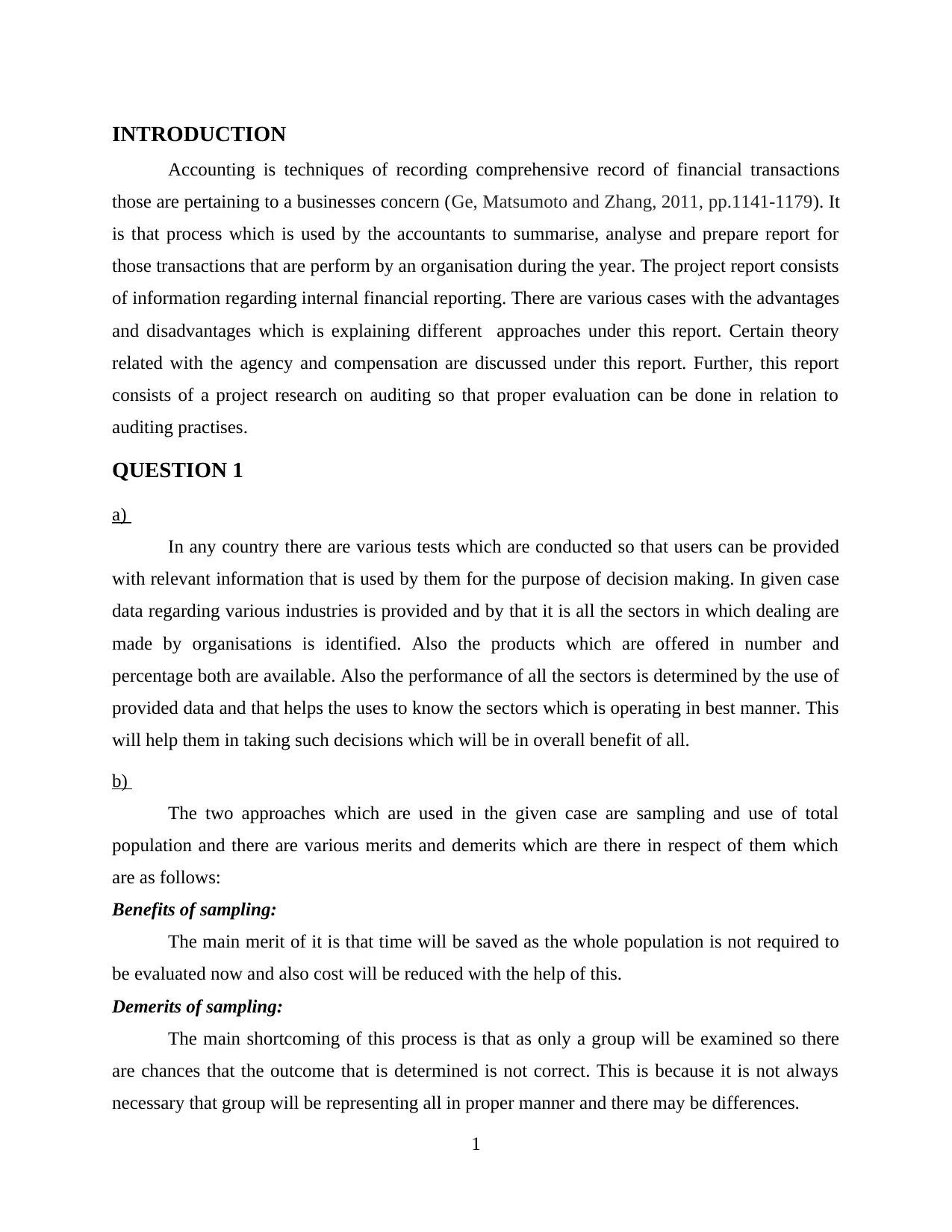
INTRODUCTION
Accounting is techniques of recording comprehensive record of financial transactions
those are pertaining to a businesses concern (Ge, Matsumoto and Zhang, 2011, pp.1141-1179). It
is that process which is used by the accountants to summarise, analyse and prepare report for
those transactions that are perform by an organisation during the year. The project report consists
of information regarding internal financial reporting. There are various cases with the advantages
and disadvantages which is explaining different approaches under this report. Certain theory
related with the agency and compensation are discussed under this report. Further, this report
consists of a project research on auditing so that proper evaluation can be done in relation to
auditing practises.
QUESTION 1
a)
In any country there are various tests which are conducted so that users can be provided
with relevant information that is used by them for the purpose of decision making. In given case
data regarding various industries is provided and by that it is all the sectors in which dealing are
made by organisations is identified. Also the products which are offered in number and
percentage both are available. Also the performance of all the sectors is determined by the use of
provided data and that helps the uses to know the sectors which is operating in best manner. This
will help them in taking such decisions which will be in overall benefit of all.
b)
The two approaches which are used in the given case are sampling and use of total
population and there are various merits and demerits which are there in respect of them which
are as follows:
Benefits of sampling:
The main merit of it is that time will be saved as the whole population is not required to
be evaluated now and also cost will be reduced with the help of this.
Demerits of sampling:
The main shortcoming of this process is that as only a group will be examined so there
are chances that the outcome that is determined is not correct. This is because it is not always
necessary that group will be representing all in proper manner and there may be differences.
1
Accounting is techniques of recording comprehensive record of financial transactions
those are pertaining to a businesses concern (Ge, Matsumoto and Zhang, 2011, pp.1141-1179). It
is that process which is used by the accountants to summarise, analyse and prepare report for
those transactions that are perform by an organisation during the year. The project report consists
of information regarding internal financial reporting. There are various cases with the advantages
and disadvantages which is explaining different approaches under this report. Certain theory
related with the agency and compensation are discussed under this report. Further, this report
consists of a project research on auditing so that proper evaluation can be done in relation to
auditing practises.
QUESTION 1
a)
In any country there are various tests which are conducted so that users can be provided
with relevant information that is used by them for the purpose of decision making. In given case
data regarding various industries is provided and by that it is all the sectors in which dealing are
made by organisations is identified. Also the products which are offered in number and
percentage both are available. Also the performance of all the sectors is determined by the use of
provided data and that helps the uses to know the sectors which is operating in best manner. This
will help them in taking such decisions which will be in overall benefit of all.
b)
The two approaches which are used in the given case are sampling and use of total
population and there are various merits and demerits which are there in respect of them which
are as follows:
Benefits of sampling:
The main merit of it is that time will be saved as the whole population is not required to
be evaluated now and also cost will be reduced with the help of this.
Demerits of sampling:
The main shortcoming of this process is that as only a group will be examined so there
are chances that the outcome that is determined is not correct. This is because it is not always
necessary that group will be representing all in proper manner and there may be differences.
1
⊘ This is a preview!⊘
Do you want full access?
Subscribe today to unlock all pages.

Trusted by 1+ million students worldwide
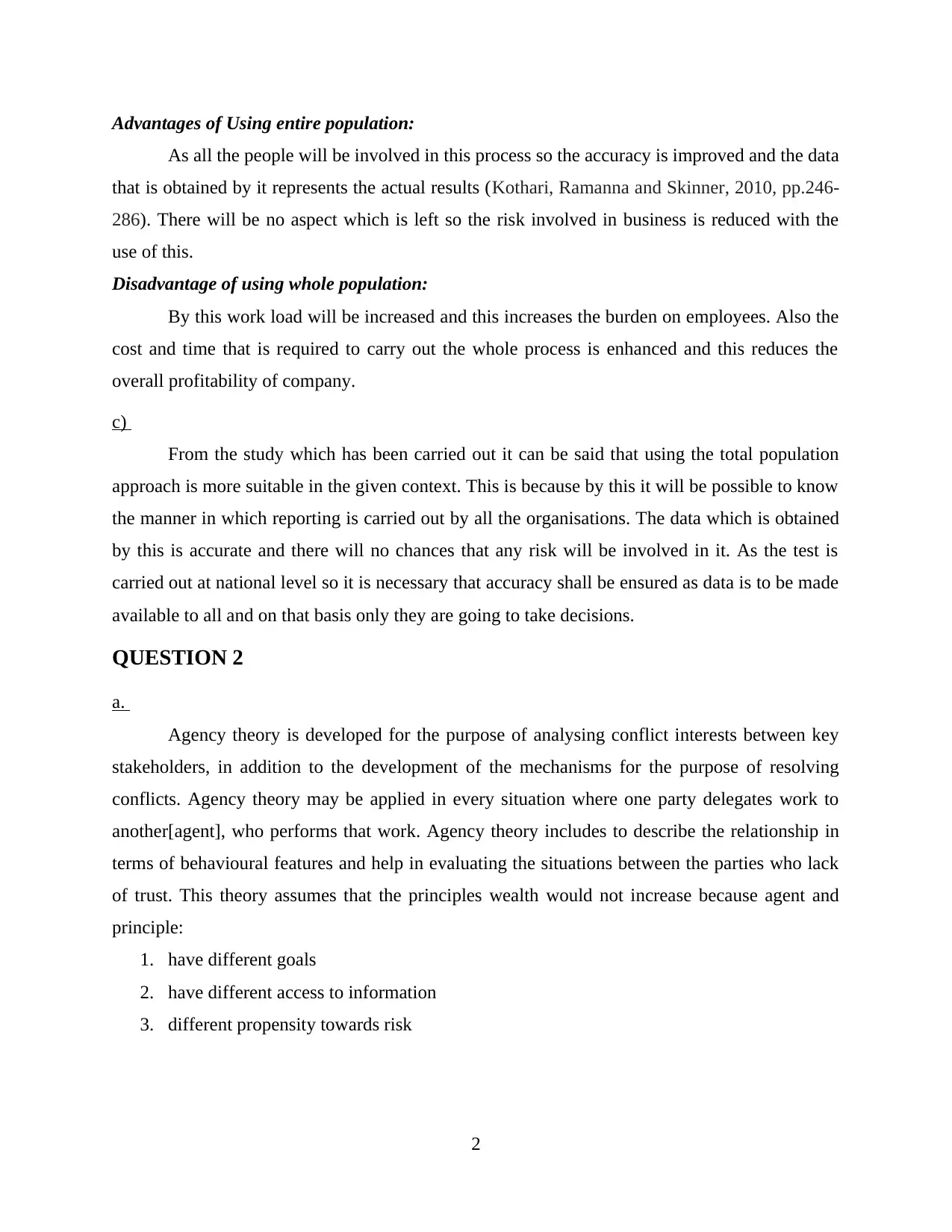
Advantages of Using entire population:
As all the people will be involved in this process so the accuracy is improved and the data
that is obtained by it represents the actual results (Kothari, Ramanna and Skinner, 2010, pp.246-
286). There will be no aspect which is left so the risk involved in business is reduced with the
use of this.
Disadvantage of using whole population:
By this work load will be increased and this increases the burden on employees. Also the
cost and time that is required to carry out the whole process is enhanced and this reduces the
overall profitability of company.
c)
From the study which has been carried out it can be said that using the total population
approach is more suitable in the given context. This is because by this it will be possible to know
the manner in which reporting is carried out by all the organisations. The data which is obtained
by this is accurate and there will no chances that any risk will be involved in it. As the test is
carried out at national level so it is necessary that accuracy shall be ensured as data is to be made
available to all and on that basis only they are going to take decisions.
QUESTION 2
a.
Agency theory is developed for the purpose of analysing conflict interests between key
stakeholders, in addition to the development of the mechanisms for the purpose of resolving
conflicts. Agency theory may be applied in every situation where one party delegates work to
another[agent], who performs that work. Agency theory includes to describe the relationship in
terms of behavioural features and help in evaluating the situations between the parties who lack
of trust. This theory assumes that the principles wealth would not increase because agent and
principle:
1. have different goals
2. have different access to information
3. different propensity towards risk
2
As all the people will be involved in this process so the accuracy is improved and the data
that is obtained by it represents the actual results (Kothari, Ramanna and Skinner, 2010, pp.246-
286). There will be no aspect which is left so the risk involved in business is reduced with the
use of this.
Disadvantage of using whole population:
By this work load will be increased and this increases the burden on employees. Also the
cost and time that is required to carry out the whole process is enhanced and this reduces the
overall profitability of company.
c)
From the study which has been carried out it can be said that using the total population
approach is more suitable in the given context. This is because by this it will be possible to know
the manner in which reporting is carried out by all the organisations. The data which is obtained
by this is accurate and there will no chances that any risk will be involved in it. As the test is
carried out at national level so it is necessary that accuracy shall be ensured as data is to be made
available to all and on that basis only they are going to take decisions.
QUESTION 2
a.
Agency theory is developed for the purpose of analysing conflict interests between key
stakeholders, in addition to the development of the mechanisms for the purpose of resolving
conflicts. Agency theory may be applied in every situation where one party delegates work to
another[agent], who performs that work. Agency theory includes to describe the relationship in
terms of behavioural features and help in evaluating the situations between the parties who lack
of trust. This theory assumes that the principles wealth would not increase because agent and
principle:
1. have different goals
2. have different access to information
3. different propensity towards risk
2
Paraphrase This Document
Need a fresh take? Get an instant paraphrase of this document with our AI Paraphraser
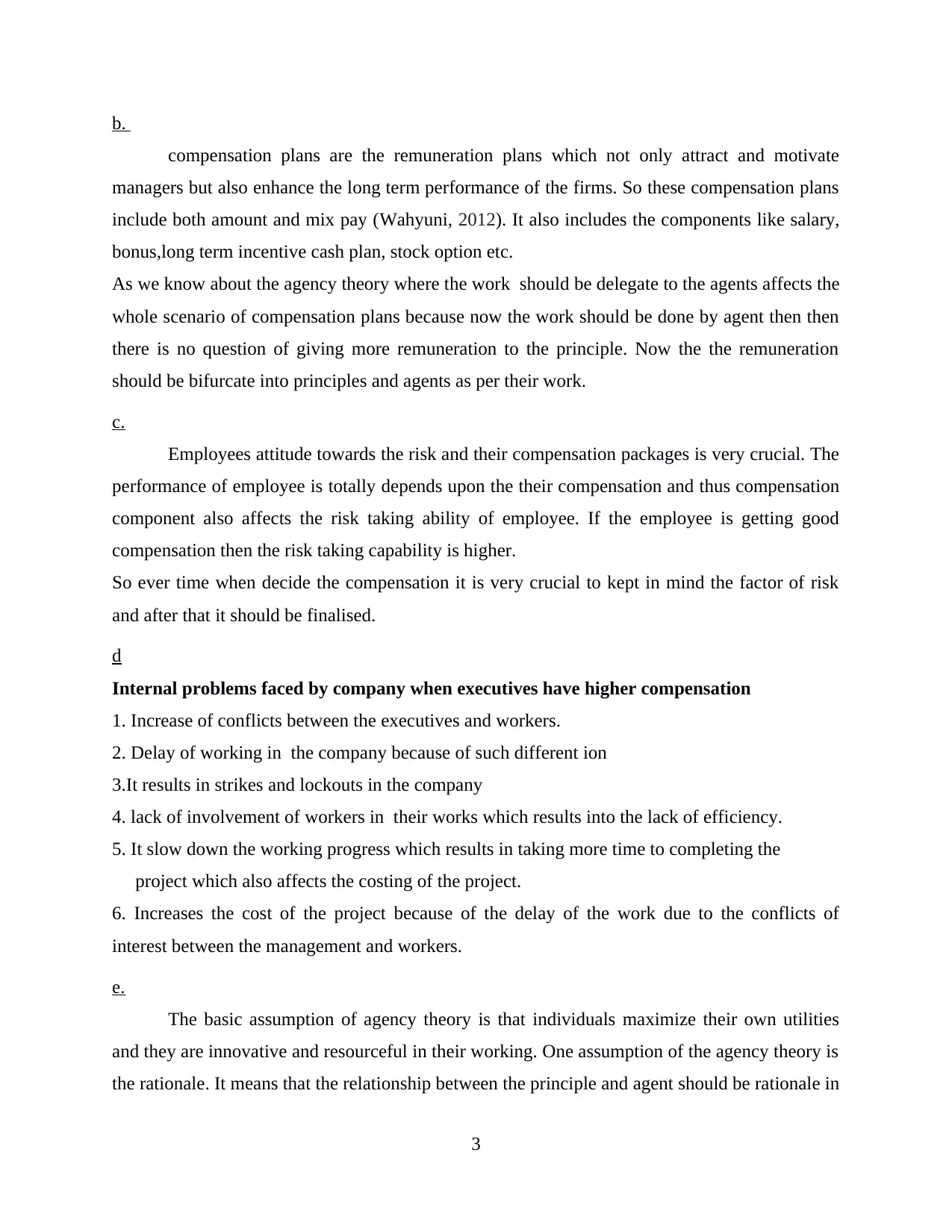
b.
compensation plans are the remuneration plans which not only attract and motivate
managers but also enhance the long term performance of the firms. So these compensation plans
include both amount and mix pay (Wahyuni, 2012). It also includes the components like salary,
bonus,long term incentive cash plan, stock option etc.
As we know about the agency theory where the work should be delegate to the agents affects the
whole scenario of compensation plans because now the work should be done by agent then then
there is no question of giving more remuneration to the principle. Now the the remuneration
should be bifurcate into principles and agents as per their work.
c.
Employees attitude towards the risk and their compensation packages is very crucial. The
performance of employee is totally depends upon the their compensation and thus compensation
component also affects the risk taking ability of employee. If the employee is getting good
compensation then the risk taking capability is higher.
So ever time when decide the compensation it is very crucial to kept in mind the factor of risk
and after that it should be finalised.
d
Internal problems faced by company when executives have higher compensation
1. Increase of conflicts between the executives and workers.
2. Delay of working in the company because of such different ion
3.It results in strikes and lockouts in the company
4. lack of involvement of workers in their works which results into the lack of efficiency.
5. It slow down the working progress which results in taking more time to completing the
project which also affects the costing of the project.
6. Increases the cost of the project because of the delay of the work due to the conflicts of
interest between the management and workers.
e.
The basic assumption of agency theory is that individuals maximize their own utilities
and they are innovative and resourceful in their working. One assumption of the agency theory is
the rationale. It means that the relationship between the principle and agent should be rationale in
3
compensation plans are the remuneration plans which not only attract and motivate
managers but also enhance the long term performance of the firms. So these compensation plans
include both amount and mix pay (Wahyuni, 2012). It also includes the components like salary,
bonus,long term incentive cash plan, stock option etc.
As we know about the agency theory where the work should be delegate to the agents affects the
whole scenario of compensation plans because now the work should be done by agent then then
there is no question of giving more remuneration to the principle. Now the the remuneration
should be bifurcate into principles and agents as per their work.
c.
Employees attitude towards the risk and their compensation packages is very crucial. The
performance of employee is totally depends upon the their compensation and thus compensation
component also affects the risk taking ability of employee. If the employee is getting good
compensation then the risk taking capability is higher.
So ever time when decide the compensation it is very crucial to kept in mind the factor of risk
and after that it should be finalised.
d
Internal problems faced by company when executives have higher compensation
1. Increase of conflicts between the executives and workers.
2. Delay of working in the company because of such different ion
3.It results in strikes and lockouts in the company
4. lack of involvement of workers in their works which results into the lack of efficiency.
5. It slow down the working progress which results in taking more time to completing the
project which also affects the costing of the project.
6. Increases the cost of the project because of the delay of the work due to the conflicts of
interest between the management and workers.
e.
The basic assumption of agency theory is that individuals maximize their own utilities
and they are innovative and resourceful in their working. One assumption of the agency theory is
the rationale. It means that the relationship between the principle and agent should be rationale in
3
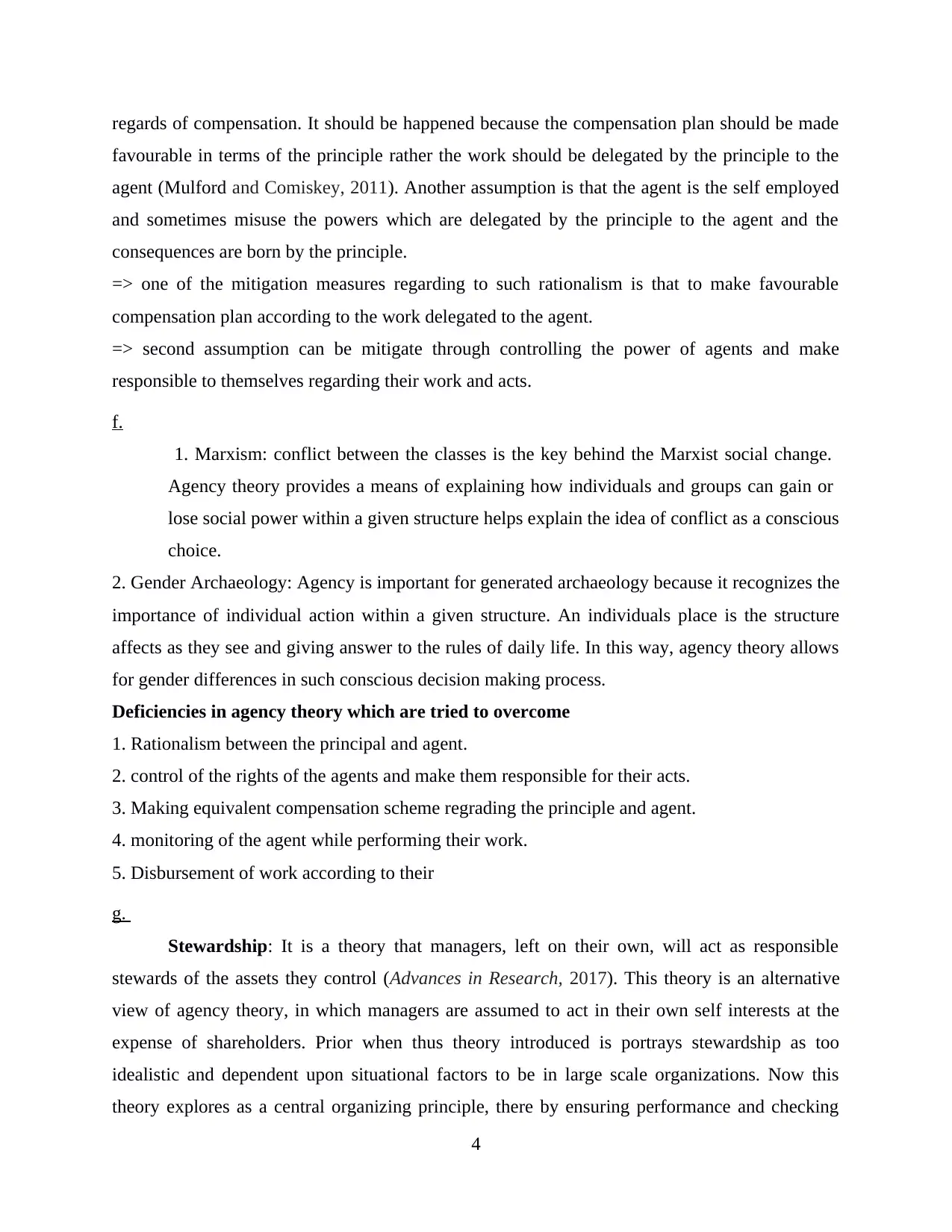
regards of compensation. It should be happened because the compensation plan should be made
favourable in terms of the principle rather the work should be delegated by the principle to the
agent (Mulford and Comiskey, 2011). Another assumption is that the agent is the self employed
and sometimes misuse the powers which are delegated by the principle to the agent and the
consequences are born by the principle.
=> one of the mitigation measures regarding to such rationalism is that to make favourable
compensation plan according to the work delegated to the agent.
=> second assumption can be mitigate through controlling the power of agents and make
responsible to themselves regarding their work and acts.
f.
1. Marxism: conflict between the classes is the key behind the Marxist social change.
Agency theory provides a means of explaining how individuals and groups can gain or
lose social power within a given structure helps explain the idea of conflict as a conscious
choice.
2. Gender Archaeology: Agency is important for generated archaeology because it recognizes the
importance of individual action within a given structure. An individuals place is the structure
affects as they see and giving answer to the rules of daily life. In this way, agency theory allows
for gender differences in such conscious decision making process.
Deficiencies in agency theory which are tried to overcome
1. Rationalism between the principal and agent.
2. control of the rights of the agents and make them responsible for their acts.
3. Making equivalent compensation scheme regrading the principle and agent.
4. monitoring of the agent while performing their work.
5. Disbursement of work according to their
g.
Stewardship: It is a theory that managers, left on their own, will act as responsible
stewards of the assets they control (Advances in Research, 2017). This theory is an alternative
view of agency theory, in which managers are assumed to act in their own self interests at the
expense of shareholders. Prior when thus theory introduced is portrays stewardship as too
idealistic and dependent upon situational factors to be in large scale organizations. Now this
theory explores as a central organizing principle, there by ensuring performance and checking
4
favourable in terms of the principle rather the work should be delegated by the principle to the
agent (Mulford and Comiskey, 2011). Another assumption is that the agent is the self employed
and sometimes misuse the powers which are delegated by the principle to the agent and the
consequences are born by the principle.
=> one of the mitigation measures regarding to such rationalism is that to make favourable
compensation plan according to the work delegated to the agent.
=> second assumption can be mitigate through controlling the power of agents and make
responsible to themselves regarding their work and acts.
f.
1. Marxism: conflict between the classes is the key behind the Marxist social change.
Agency theory provides a means of explaining how individuals and groups can gain or
lose social power within a given structure helps explain the idea of conflict as a conscious
choice.
2. Gender Archaeology: Agency is important for generated archaeology because it recognizes the
importance of individual action within a given structure. An individuals place is the structure
affects as they see and giving answer to the rules of daily life. In this way, agency theory allows
for gender differences in such conscious decision making process.
Deficiencies in agency theory which are tried to overcome
1. Rationalism between the principal and agent.
2. control of the rights of the agents and make them responsible for their acts.
3. Making equivalent compensation scheme regrading the principle and agent.
4. monitoring of the agent while performing their work.
5. Disbursement of work according to their
g.
Stewardship: It is a theory that managers, left on their own, will act as responsible
stewards of the assets they control (Advances in Research, 2017). This theory is an alternative
view of agency theory, in which managers are assumed to act in their own self interests at the
expense of shareholders. Prior when thus theory introduced is portrays stewardship as too
idealistic and dependent upon situational factors to be in large scale organizations. Now this
theory explores as a central organizing principle, there by ensuring performance and checking
4
⊘ This is a preview!⊘
Do you want full access?
Subscribe today to unlock all pages.

Trusted by 1+ million students worldwide
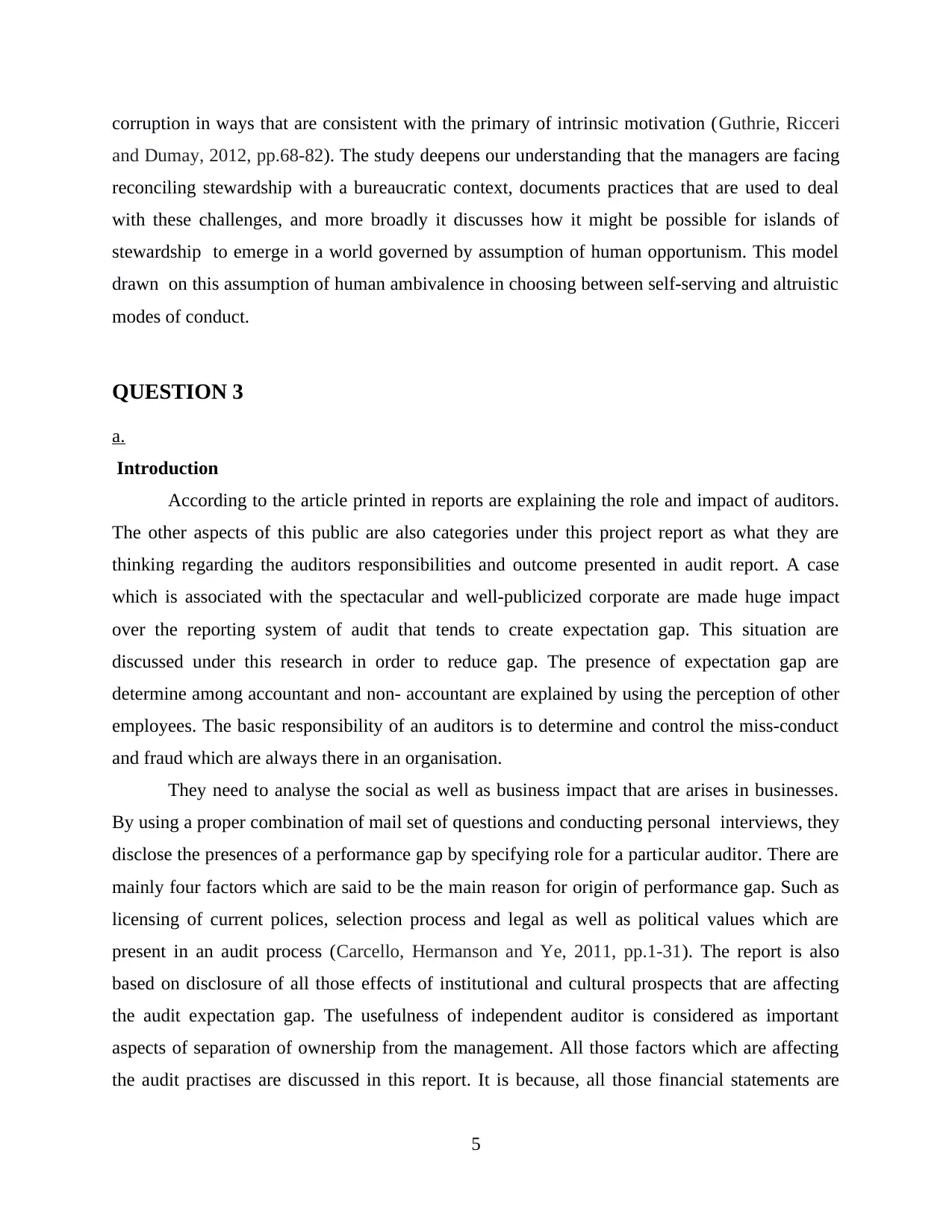
corruption in ways that are consistent with the primary of intrinsic motivation (Guthrie, Ricceri
and Dumay, 2012, pp.68-82). The study deepens our understanding that the managers are facing
reconciling stewardship with a bureaucratic context, documents practices that are used to deal
with these challenges, and more broadly it discusses how it might be possible for islands of
stewardship to emerge in a world governed by assumption of human opportunism. This model
drawn on this assumption of human ambivalence in choosing between self-serving and altruistic
modes of conduct.
QUESTION 3
a.
Introduction
According to the article printed in reports are explaining the role and impact of auditors.
The other aspects of this public are also categories under this project report as what they are
thinking regarding the auditors responsibilities and outcome presented in audit report. A case
which is associated with the spectacular and well-publicized corporate are made huge impact
over the reporting system of audit that tends to create expectation gap. This situation are
discussed under this research in order to reduce gap. The presence of expectation gap are
determine among accountant and non- accountant are explained by using the perception of other
employees. The basic responsibility of an auditors is to determine and control the miss-conduct
and fraud which are always there in an organisation.
They need to analyse the social as well as business impact that are arises in businesses.
By using a proper combination of mail set of questions and conducting personal interviews, they
disclose the presences of a performance gap by specifying role for a particular auditor. There are
mainly four factors which are said to be the main reason for origin of performance gap. Such as
licensing of current polices, selection process and legal as well as political values which are
present in an audit process (Carcello, Hermanson and Ye, 2011, pp.1-31). The report is also
based on disclosure of all those effects of institutional and cultural prospects that are affecting
the audit expectation gap. The usefulness of independent auditor is considered as important
aspects of separation of ownership from the management. All those factors which are affecting
the audit practises are discussed in this report. It is because, all those financial statements are
5
and Dumay, 2012, pp.68-82). The study deepens our understanding that the managers are facing
reconciling stewardship with a bureaucratic context, documents practices that are used to deal
with these challenges, and more broadly it discusses how it might be possible for islands of
stewardship to emerge in a world governed by assumption of human opportunism. This model
drawn on this assumption of human ambivalence in choosing between self-serving and altruistic
modes of conduct.
QUESTION 3
a.
Introduction
According to the article printed in reports are explaining the role and impact of auditors.
The other aspects of this public are also categories under this project report as what they are
thinking regarding the auditors responsibilities and outcome presented in audit report. A case
which is associated with the spectacular and well-publicized corporate are made huge impact
over the reporting system of audit that tends to create expectation gap. This situation are
discussed under this research in order to reduce gap. The presence of expectation gap are
determine among accountant and non- accountant are explained by using the perception of other
employees. The basic responsibility of an auditors is to determine and control the miss-conduct
and fraud which are always there in an organisation.
They need to analyse the social as well as business impact that are arises in businesses.
By using a proper combination of mail set of questions and conducting personal interviews, they
disclose the presences of a performance gap by specifying role for a particular auditor. There are
mainly four factors which are said to be the main reason for origin of performance gap. Such as
licensing of current polices, selection process and legal as well as political values which are
present in an audit process (Carcello, Hermanson and Ye, 2011, pp.1-31). The report is also
based on disclosure of all those effects of institutional and cultural prospects that are affecting
the audit expectation gap. The usefulness of independent auditor is considered as important
aspects of separation of ownership from the management. All those factors which are affecting
the audit practises are discussed in this report. It is because, all those financial statements are
5
Paraphrase This Document
Need a fresh take? Get an instant paraphrase of this document with our AI Paraphraser
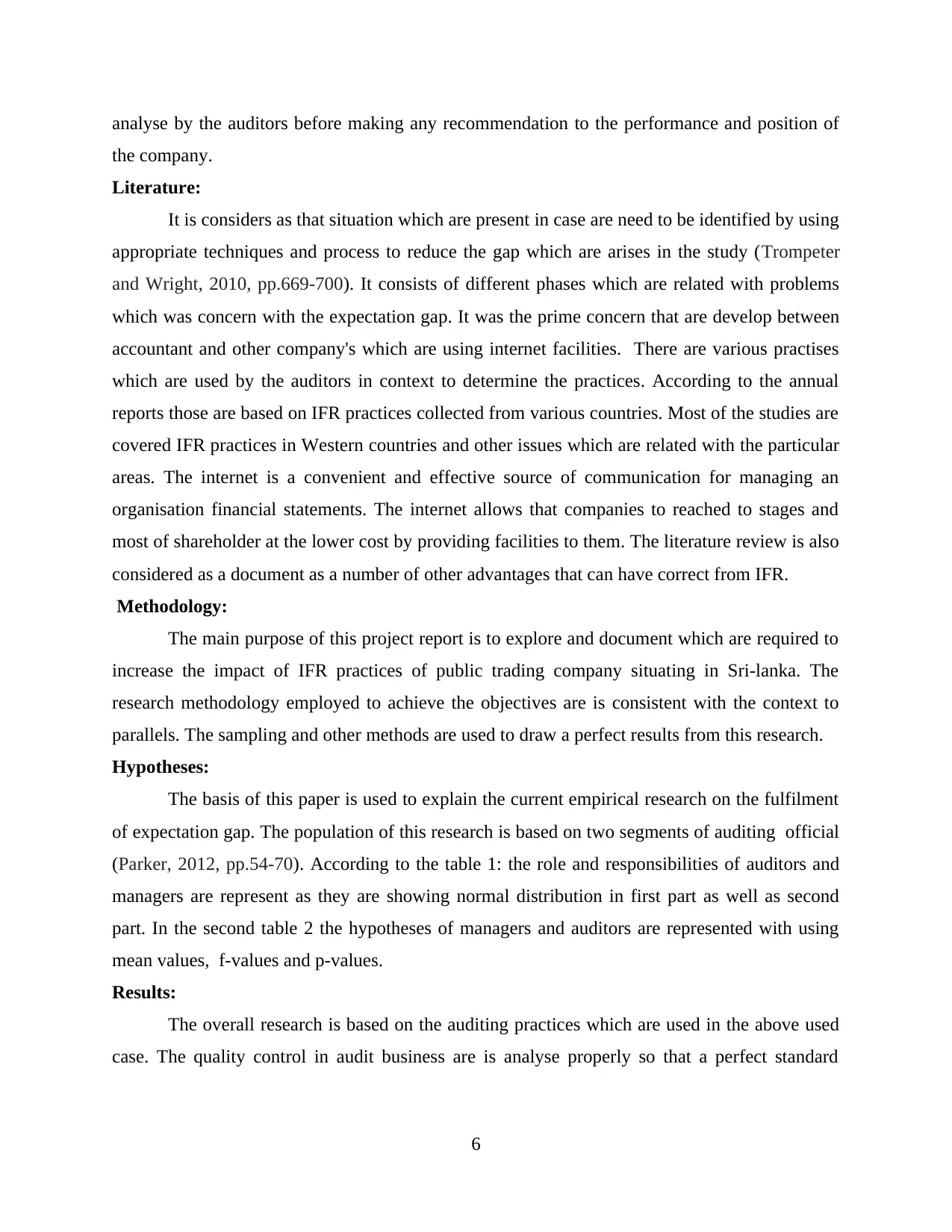
analyse by the auditors before making any recommendation to the performance and position of
the company.
Literature:
It is considers as that situation which are present in case are need to be identified by using
appropriate techniques and process to reduce the gap which are arises in the study (Trompeter
and Wright, 2010, pp.669-700). It consists of different phases which are related with problems
which was concern with the expectation gap. It was the prime concern that are develop between
accountant and other company's which are using internet facilities. There are various practises
which are used by the auditors in context to determine the practices. According to the annual
reports those are based on IFR practices collected from various countries. Most of the studies are
covered IFR practices in Western countries and other issues which are related with the particular
areas. The internet is a convenient and effective source of communication for managing an
organisation financial statements. The internet allows that companies to reached to stages and
most of shareholder at the lower cost by providing facilities to them. The literature review is also
considered as a document as a number of other advantages that can have correct from IFR.
Methodology:
The main purpose of this project report is to explore and document which are required to
increase the impact of IFR practices of public trading company situating in Sri-lanka. The
research methodology employed to achieve the objectives are is consistent with the context to
parallels. The sampling and other methods are used to draw a perfect results from this research.
Hypotheses:
The basis of this paper is used to explain the current empirical research on the fulfilment
of expectation gap. The population of this research is based on two segments of auditing official
(Parker, 2012, pp.54-70). According to the table 1: the role and responsibilities of auditors and
managers are represent as they are showing normal distribution in first part as well as second
part. In the second table 2 the hypotheses of managers and auditors are represented with using
mean values, f-values and p-values.
Results:
The overall research is based on the auditing practices which are used in the above used
case. The quality control in audit business are is analyse properly so that a perfect standard
6
the company.
Literature:
It is considers as that situation which are present in case are need to be identified by using
appropriate techniques and process to reduce the gap which are arises in the study (Trompeter
and Wright, 2010, pp.669-700). It consists of different phases which are related with problems
which was concern with the expectation gap. It was the prime concern that are develop between
accountant and other company's which are using internet facilities. There are various practises
which are used by the auditors in context to determine the practices. According to the annual
reports those are based on IFR practices collected from various countries. Most of the studies are
covered IFR practices in Western countries and other issues which are related with the particular
areas. The internet is a convenient and effective source of communication for managing an
organisation financial statements. The internet allows that companies to reached to stages and
most of shareholder at the lower cost by providing facilities to them. The literature review is also
considered as a document as a number of other advantages that can have correct from IFR.
Methodology:
The main purpose of this project report is to explore and document which are required to
increase the impact of IFR practices of public trading company situating in Sri-lanka. The
research methodology employed to achieve the objectives are is consistent with the context to
parallels. The sampling and other methods are used to draw a perfect results from this research.
Hypotheses:
The basis of this paper is used to explain the current empirical research on the fulfilment
of expectation gap. The population of this research is based on two segments of auditing official
(Parker, 2012, pp.54-70). According to the table 1: the role and responsibilities of auditors and
managers are represent as they are showing normal distribution in first part as well as second
part. In the second table 2 the hypotheses of managers and auditors are represented with using
mean values, f-values and p-values.
Results:
The overall research is based on the auditing practices which are used in the above used
case. The quality control in audit business are is analyse properly so that a perfect standard
6
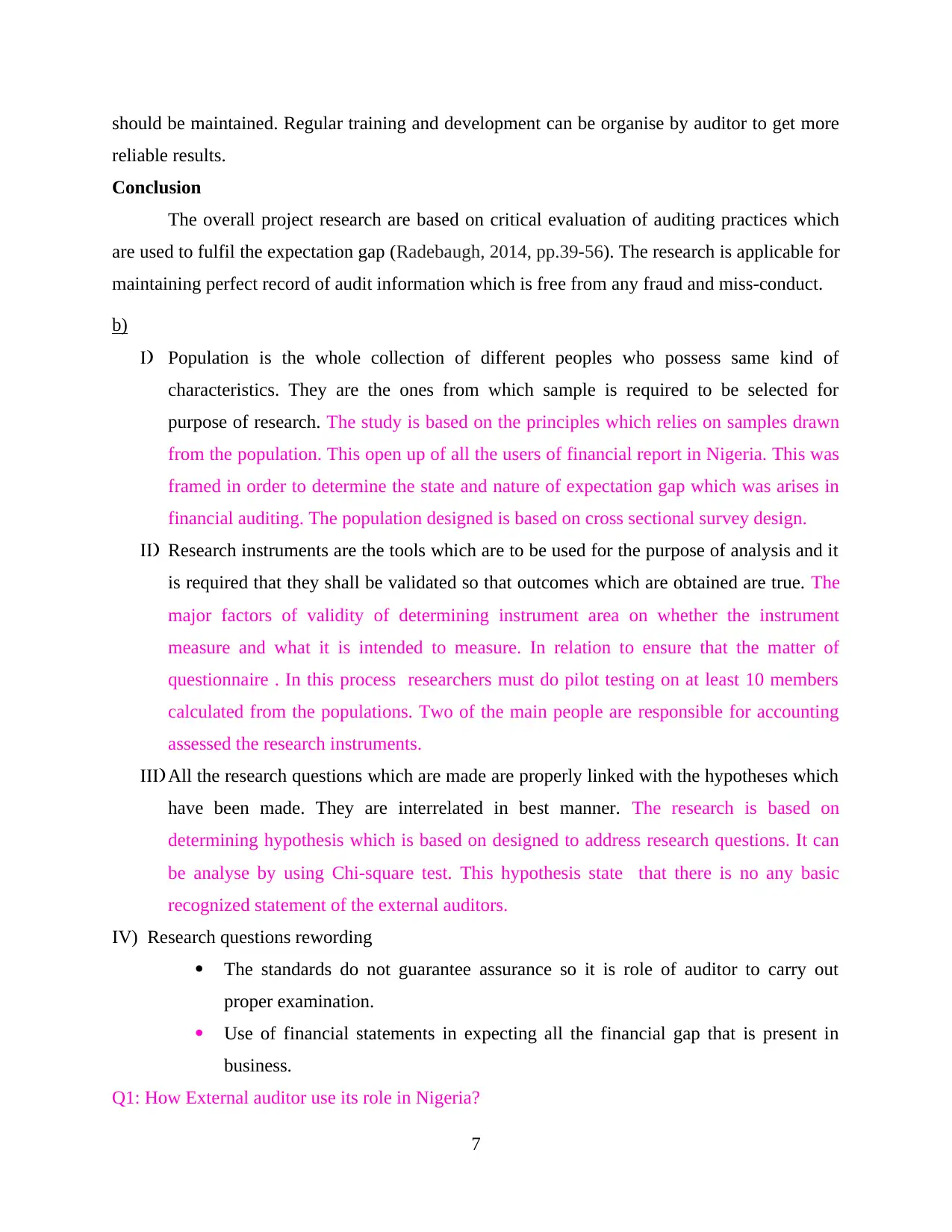
should be maintained. Regular training and development can be organise by auditor to get more
reliable results.
Conclusion
The overall project research are based on critical evaluation of auditing practices which
are used to fulfil the expectation gap (Radebaugh, 2014, pp.39-56). The research is applicable for
maintaining perfect record of audit information which is free from any fraud and miss-conduct.
b)
I) Population is the whole collection of different peoples who possess same kind of
characteristics. They are the ones from which sample is required to be selected for
purpose of research. The study is based on the principles which relies on samples drawn
from the population. This open up of all the users of financial report in Nigeria. This was
framed in order to determine the state and nature of expectation gap which was arises in
financial auditing. The population designed is based on cross sectional survey design.
II) Research instruments are the tools which are to be used for the purpose of analysis and it
is required that they shall be validated so that outcomes which are obtained are true. The
major factors of validity of determining instrument area on whether the instrument
measure and what it is intended to measure. In relation to ensure that the matter of
questionnaire . In this process researchers must do pilot testing on at least 10 members
calculated from the populations. Two of the main people are responsible for accounting
assessed the research instruments.
III) All the research questions which are made are properly linked with the hypotheses which
have been made. They are interrelated in best manner. The research is based on
determining hypothesis which is based on designed to address research questions. It can
be analyse by using Chi-square test. This hypothesis state that there is no any basic
recognized statement of the external auditors.
IV) Research questions rewording
The standards do not guarantee assurance so it is role of auditor to carry out
proper examination.
Use of financial statements in expecting all the financial gap that is present in
business.
Q1: How External auditor use its role in Nigeria?
7
reliable results.
Conclusion
The overall project research are based on critical evaluation of auditing practices which
are used to fulfil the expectation gap (Radebaugh, 2014, pp.39-56). The research is applicable for
maintaining perfect record of audit information which is free from any fraud and miss-conduct.
b)
I) Population is the whole collection of different peoples who possess same kind of
characteristics. They are the ones from which sample is required to be selected for
purpose of research. The study is based on the principles which relies on samples drawn
from the population. This open up of all the users of financial report in Nigeria. This was
framed in order to determine the state and nature of expectation gap which was arises in
financial auditing. The population designed is based on cross sectional survey design.
II) Research instruments are the tools which are to be used for the purpose of analysis and it
is required that they shall be validated so that outcomes which are obtained are true. The
major factors of validity of determining instrument area on whether the instrument
measure and what it is intended to measure. In relation to ensure that the matter of
questionnaire . In this process researchers must do pilot testing on at least 10 members
calculated from the populations. Two of the main people are responsible for accounting
assessed the research instruments.
III) All the research questions which are made are properly linked with the hypotheses which
have been made. They are interrelated in best manner. The research is based on
determining hypothesis which is based on designed to address research questions. It can
be analyse by using Chi-square test. This hypothesis state that there is no any basic
recognized statement of the external auditors.
IV) Research questions rewording
The standards do not guarantee assurance so it is role of auditor to carry out
proper examination.
Use of financial statements in expecting all the financial gap that is present in
business.
Q1: How External auditor use its role in Nigeria?
7
⊘ This is a preview!⊘
Do you want full access?
Subscribe today to unlock all pages.

Trusted by 1+ million students worldwide
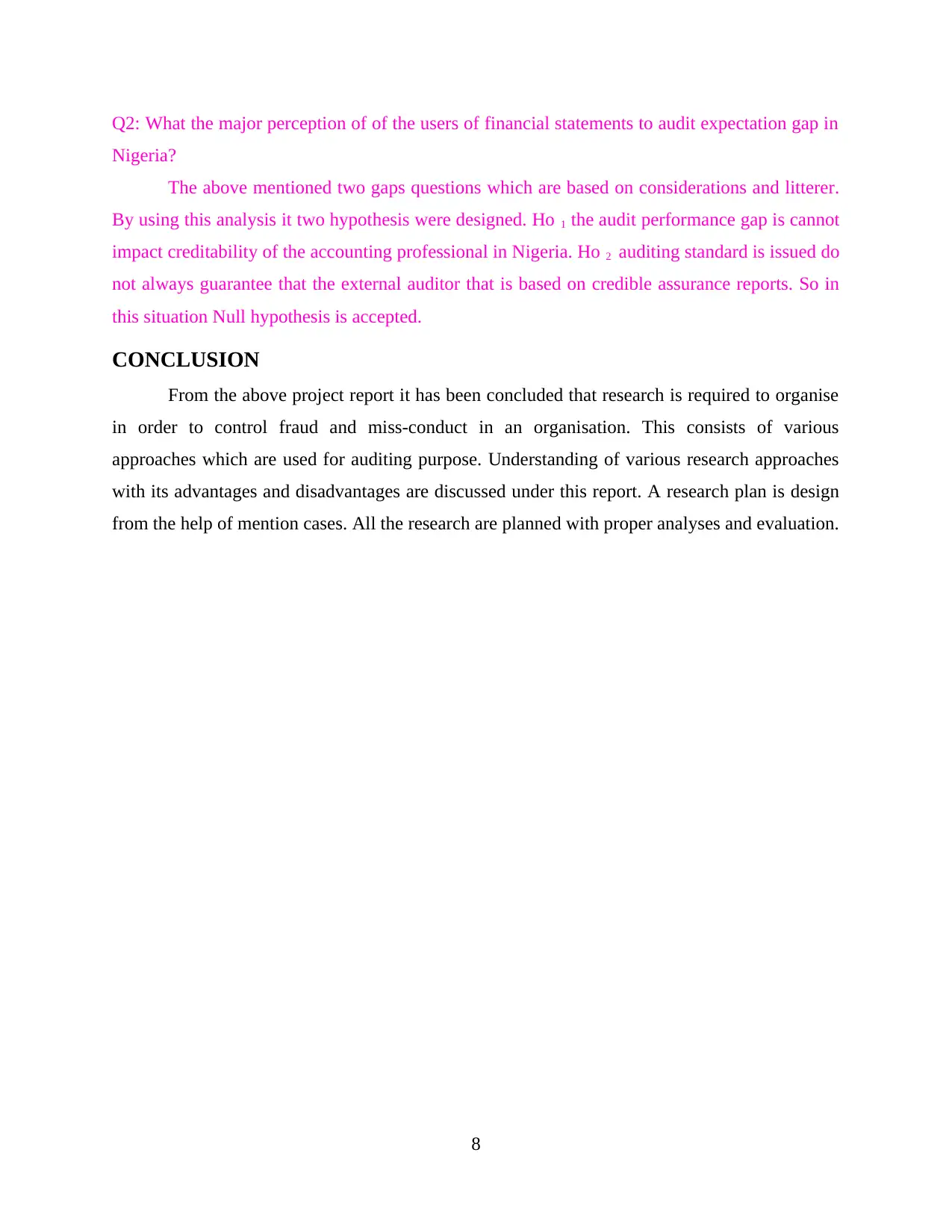
Q2: What the major perception of of the users of financial statements to audit expectation gap in
Nigeria?
The above mentioned two gaps questions which are based on considerations and litterer.
By using this analysis it two hypothesis were designed. Ho 1 the audit performance gap is cannot
impact creditability of the accounting professional in Nigeria. Ho 2 auditing standard is issued do
not always guarantee that the external auditor that is based on credible assurance reports. So in
this situation Null hypothesis is accepted.
CONCLUSION
From the above project report it has been concluded that research is required to organise
in order to control fraud and miss-conduct in an organisation. This consists of various
approaches which are used for auditing purpose. Understanding of various research approaches
with its advantages and disadvantages are discussed under this report. A research plan is design
from the help of mention cases. All the research are planned with proper analyses and evaluation.
8
Nigeria?
The above mentioned two gaps questions which are based on considerations and litterer.
By using this analysis it two hypothesis were designed. Ho 1 the audit performance gap is cannot
impact creditability of the accounting professional in Nigeria. Ho 2 auditing standard is issued do
not always guarantee that the external auditor that is based on credible assurance reports. So in
this situation Null hypothesis is accepted.
CONCLUSION
From the above project report it has been concluded that research is required to organise
in order to control fraud and miss-conduct in an organisation. This consists of various
approaches which are used for auditing purpose. Understanding of various research approaches
with its advantages and disadvantages are discussed under this report. A research plan is design
from the help of mention cases. All the research are planned with proper analyses and evaluation.
8
Paraphrase This Document
Need a fresh take? Get an instant paraphrase of this document with our AI Paraphraser
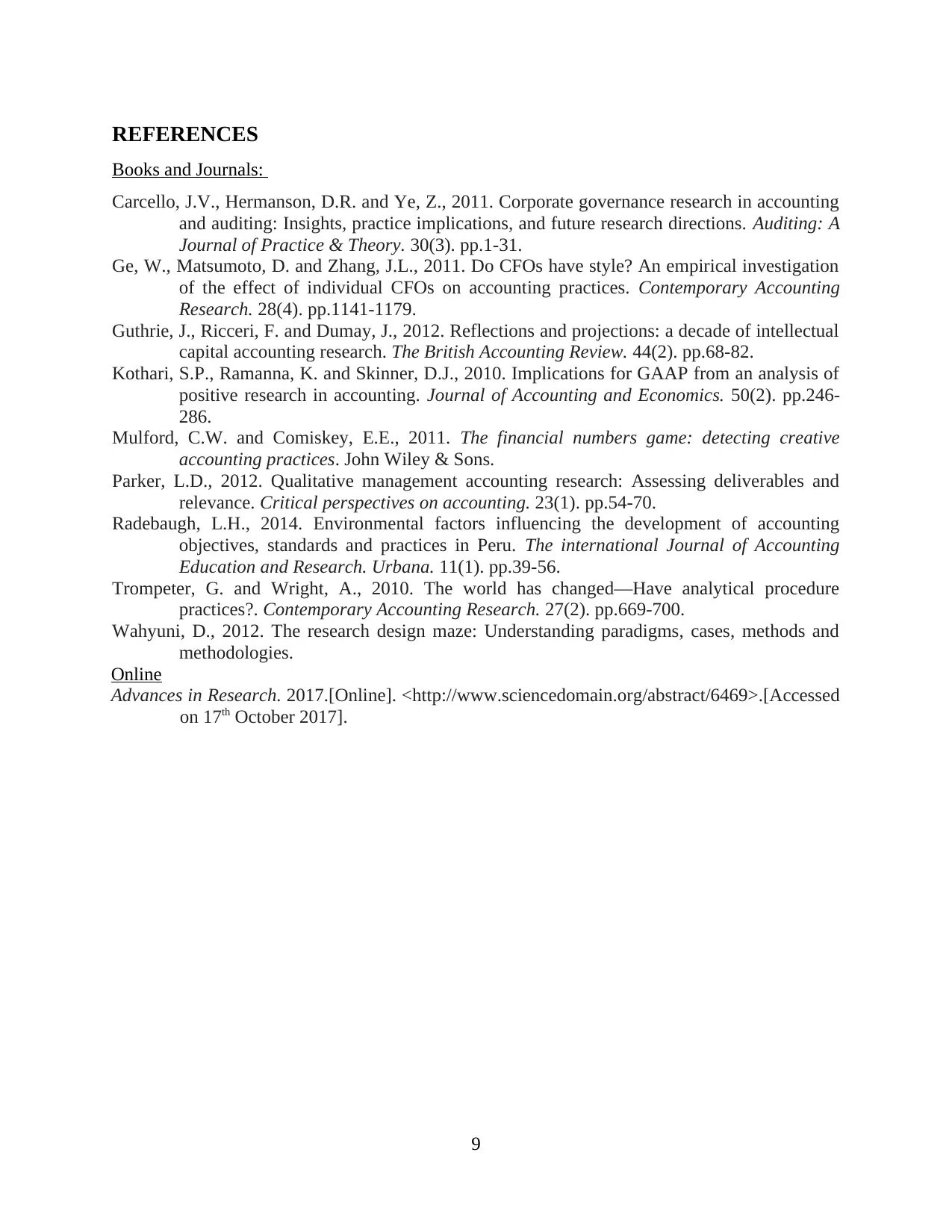
REFERENCES
Books and Journals:
Carcello, J.V., Hermanson, D.R. and Ye, Z., 2011. Corporate governance research in accounting
and auditing: Insights, practice implications, and future research directions. Auditing: A
Journal of Practice & Theory. 30(3). pp.1-31.
Ge, W., Matsumoto, D. and Zhang, J.L., 2011. Do CFOs have style? An empirical investigation
of the effect of individual CFOs on accounting practices. Contemporary Accounting
Research. 28(4). pp.1141-1179.
Guthrie, J., Ricceri, F. and Dumay, J., 2012. Reflections and projections: a decade of intellectual
capital accounting research. The British Accounting Review. 44(2). pp.68-82.
Kothari, S.P., Ramanna, K. and Skinner, D.J., 2010. Implications for GAAP from an analysis of
positive research in accounting. Journal of Accounting and Economics. 50(2). pp.246-
286.
Mulford, C.W. and Comiskey, E.E., 2011. The financial numbers game: detecting creative
accounting practices. John Wiley & Sons.
Parker, L.D., 2012. Qualitative management accounting research: Assessing deliverables and
relevance. Critical perspectives on accounting. 23(1). pp.54-70.
Radebaugh, L.H., 2014. Environmental factors influencing the development of accounting
objectives, standards and practices in Peru. The international Journal of Accounting
Education and Research. Urbana. 11(1). pp.39-56.
Trompeter, G. and Wright, A., 2010. The world has changed—Have analytical procedure
practices?. Contemporary Accounting Research. 27(2). pp.669-700.
Wahyuni, D., 2012. The research design maze: Understanding paradigms, cases, methods and
methodologies.
Online
Advances in Research. 2017.[Online]. <http://www.sciencedomain.org/abstract/6469>.[Accessed
on 17th October 2017].
9
Books and Journals:
Carcello, J.V., Hermanson, D.R. and Ye, Z., 2011. Corporate governance research in accounting
and auditing: Insights, practice implications, and future research directions. Auditing: A
Journal of Practice & Theory. 30(3). pp.1-31.
Ge, W., Matsumoto, D. and Zhang, J.L., 2011. Do CFOs have style? An empirical investigation
of the effect of individual CFOs on accounting practices. Contemporary Accounting
Research. 28(4). pp.1141-1179.
Guthrie, J., Ricceri, F. and Dumay, J., 2012. Reflections and projections: a decade of intellectual
capital accounting research. The British Accounting Review. 44(2). pp.68-82.
Kothari, S.P., Ramanna, K. and Skinner, D.J., 2010. Implications for GAAP from an analysis of
positive research in accounting. Journal of Accounting and Economics. 50(2). pp.246-
286.
Mulford, C.W. and Comiskey, E.E., 2011. The financial numbers game: detecting creative
accounting practices. John Wiley & Sons.
Parker, L.D., 2012. Qualitative management accounting research: Assessing deliverables and
relevance. Critical perspectives on accounting. 23(1). pp.54-70.
Radebaugh, L.H., 2014. Environmental factors influencing the development of accounting
objectives, standards and practices in Peru. The international Journal of Accounting
Education and Research. Urbana. 11(1). pp.39-56.
Trompeter, G. and Wright, A., 2010. The world has changed—Have analytical procedure
practices?. Contemporary Accounting Research. 27(2). pp.669-700.
Wahyuni, D., 2012. The research design maze: Understanding paradigms, cases, methods and
methodologies.
Online
Advances in Research. 2017.[Online]. <http://www.sciencedomain.org/abstract/6469>.[Accessed
on 17th October 2017].
9
1 out of 11
Related Documents
Your All-in-One AI-Powered Toolkit for Academic Success.
+13062052269
info@desklib.com
Available 24*7 on WhatsApp / Email
![[object Object]](/_next/static/media/star-bottom.7253800d.svg)
Unlock your academic potential
Copyright © 2020–2026 A2Z Services. All Rights Reserved. Developed and managed by ZUCOL.




